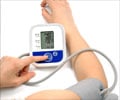New study offers strong support for lowering blood pressure and offering blood pressure lowering therapy to individuals with a history of cardiovascular disease.

The diastolic blood pressure number (DBP) or the bottom number is the pressure in the arteries when the heart relaxes between beats. A normal DBP number is 80 mmHg or less. The bottom number between 80 and 89 mmHg is normal but higher than ideal. A DBP of 90 mmHg or higher, on repeated examinations, is considered to be hypertension.
Hypertensive heart disease is one of the primary causes of death related to high BP. It refers to a group of disorders that includes heart failure ischemic heart disease, hypertensive heart disease, and left ventricular hypertrophy. Normal resting blood pressure is about 120/80 mm Hg.
The study gives solid support for lowering blood pressure and providing BP lowering medication to individuals with a history of cardiovascular disease, heart failure, coronary heart disease, chronic kidney disease, diabetes, and stroke.
In the study, researchers searched MEDLINE for large-scale blood pressure lowering trials, published between Jan 1, 1966, and July 7, 2015 and the medical literature to identify tests up to Nov 9, 2015.
In trials with higher and lower mean baseline SBP, similar proportional risk reductions were identified. "Our results provide strong support for lowering blood pressure to systolic blood pressures less than 130 mm Hg," researchers write.
Compared with other medications, β-blockers were inferior for prevention of major cardiovascular disease events; calcium channel blockers were found superior to other medications for stroke prevention. Common drugs used to treat high blood pressure include chlorthalidone, acebutolol, atenolol, benazepril hydrochloride, captopril, candesartan, amlodipine besylate, doxazosin mesylate, methyldopa, carvedilol, clonidine hydrochloride, guanadrel, hydralazine hydrocholoride,
Hypertension generally develops over many years, and it affects nearly everyone eventually. Fortunately, hypertension can be easily identified. Simple lifestyle changes like weight loss, lower sodium intake, moderate alcohol consumption, quit smoking, reduce stress levels can help control high blood pressure.
Reference:
1. Ettehad D, Emdin CA, Kiran A, et al. Blood pressure lowering for prevention of cardiovascular disease and death: a systematic review and meta-analysis. The Lancet. 2015; doi:10.1016/S0140-6736(15)01225-8.
Source-Medindia















